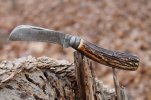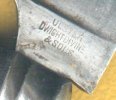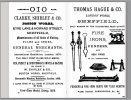-
The BladeForums.com 2024 Traditional Knife is available! Price is $250 ea (shipped within CONUS).
Order here: https://www.bladeforums.com/help/2024-traditional/
You are using an out of date browser. It may not display this or other websites correctly.
You should upgrade or use an alternative browser.
You should upgrade or use an alternative browser.
Prune Big, or Go Home!
- Thread starter waynorth
- Start date
Augie
Gold Member
- Joined
- Aug 23, 2014
- Messages
- 3,958
Thanks everyone, appreciate the comments.
Charlie, it does have integral bolsters, not sure how to tell if it is a forged spring or not.
Russell, thank you for the ad, very little information out there on Shirley's. The other side of that ad brings up even more questions though as I have a
T. Hague stag pruner that I have found no information on although the ad does not say anything about knife making.


Charlie, it does have integral bolsters, not sure how to tell if it is a forged spring or not.
Russell, thank you for the ad, very little information out there on Shirley's. The other side of that ad brings up even more questions though as I have a
T. Hague stag pruner that I have found no information on although the ad does not say anything about knife making.


Rusty1
Gold Member
- Joined
- Nov 6, 2005
- Messages
- 2,586
John, found a small bit of information regarding Thomas Hague in an article I found on line from a web journal called the Star. I included the whole piece as it goes on with other relevant knife info. I don’t know though if in the advert the items sold was a side line as Thomas Hague was also into making silver ware and fruit knives which come up during searches also.
In 1879 it was the home of cutlery manufacturer Henry Nowill who had the house built for himself and his family, and next door, at 49, lived his brother Thomas Mathias Nowill.
The firm can be traced back to 1700 when a D* mark was granted to Thomas Nowill. When Thomas passed away in 1808 this mark passed to his younger brother, William.
From this two separate companies came into being and they were Nowill & Kippax and John Nowill & Sons.
In the 1787 directory Nowill & Kippax had premises on High Street as Cutlers and Hardwaremen (not a typo this is how they are listed).
John is also listed on his own as a dealer in furniture and clothes from the same premises.
Just a year before in 1786 John went into partnership with Thomas Hague at 7 Meadow Street, he also had premises on Garden Street.
When Mr Hague retired in 1797, John renamed the business John Nowill & Co.
In 1825 Thomas retired and his sons, William and John, ran the business. They had the foresight to register a silver mark with the assay office, in 1825 they are listed as follows, Nowill Thomas and Co. manufacturers of silver fruit and dessert knives, fancy pen and pocket knives, &c. 7, Meadow St.
By 1833 their listing was Nowill Wm. & John, table, pen, pocket, & silver fruit and dessert knife mfrs. 7, Meadow Street.
John was also living in Meadow Street at that time.
Shortly after Christmas on December 28, 1836, Thomas Nowill died of, as what was then termed natural decay, old age to us now.
Just three years later in 1839 the brothers separated and William set up his concern in Rockingham Street while John continued at the Meadow Street premises.
John Nowill retired from the firm in 1847. In 1811 he had married Elizabeth Spencer and the outcome of this union produced eight sons, no television then, five of these sons entered the business, John 1818-1900, Henry 1819-1905, Thomas Mathias 1820-1892, Edward 1822-1871 and Arthur 1825-1896.
Thomas Mathias Nowill died at College Gardens in Dulwich on September 13, 1892, he was 71 years of age.
John Nowill took up the reins of the firm, in 1851 employed over 31 workers, around 31 years late the firm employed 100 men, ten lads and 15 women, this number included girls too.
John passed this life in 1900 aged 82, he had already produced the next generation of Nowills to keep the business going.
In 1914 the firm had 300 workers and they were producing highly sought after good pocket knives, pen knives, sporting knives, razors, scissors, in fact any type of implement with a good cutting edge, scissors for trimming lamp wicks, pruning scissors, any type of scissors you could think of, they made them.
In the late ‘20s, the firm had part of the family handling exports in Istanbul and Athens, their goods were high quality and quality sells.
Fast forward to WWII and their factory on Scotland Street was knocked about a bit by German bombs, the firm was sold to F.E. & J.R. Hopkinson Ltd and the firm was relocated to the Trimils Works on London Road.
Their knives, especially their bowie knives, were still being made under the Nowill name well into the 1960s, sadly the firm took less and less of the market and eventually the Nowill and Hopkinson name was acquired by Jack Adams, he keeps these world famous names alive.
On this part of Westbourne Road lived some notable people who put Sheffield on the map, at No 47, lived Lawrence Hoole, son of the Stove & Grate manufacturer Henry Elliot Hoole whose Green Lane works is now under restoration finally. Besides stoves and grates they made fenders and fire irons.
Russell
In 1879 it was the home of cutlery manufacturer Henry Nowill who had the house built for himself and his family, and next door, at 49, lived his brother Thomas Mathias Nowill.
The firm can be traced back to 1700 when a D* mark was granted to Thomas Nowill. When Thomas passed away in 1808 this mark passed to his younger brother, William.
From this two separate companies came into being and they were Nowill & Kippax and John Nowill & Sons.
In the 1787 directory Nowill & Kippax had premises on High Street as Cutlers and Hardwaremen (not a typo this is how they are listed).
John is also listed on his own as a dealer in furniture and clothes from the same premises.
Just a year before in 1786 John went into partnership with Thomas Hague at 7 Meadow Street, he also had premises on Garden Street.
When Mr Hague retired in 1797, John renamed the business John Nowill & Co.
In 1825 Thomas retired and his sons, William and John, ran the business. They had the foresight to register a silver mark with the assay office, in 1825 they are listed as follows, Nowill Thomas and Co. manufacturers of silver fruit and dessert knives, fancy pen and pocket knives, &c. 7, Meadow St.
By 1833 their listing was Nowill Wm. & John, table, pen, pocket, & silver fruit and dessert knife mfrs. 7, Meadow Street.
John was also living in Meadow Street at that time.
Shortly after Christmas on December 28, 1836, Thomas Nowill died of, as what was then termed natural decay, old age to us now.
Just three years later in 1839 the brothers separated and William set up his concern in Rockingham Street while John continued at the Meadow Street premises.
John Nowill retired from the firm in 1847. In 1811 he had married Elizabeth Spencer and the outcome of this union produced eight sons, no television then, five of these sons entered the business, John 1818-1900, Henry 1819-1905, Thomas Mathias 1820-1892, Edward 1822-1871 and Arthur 1825-1896.
Thomas Mathias Nowill died at College Gardens in Dulwich on September 13, 1892, he was 71 years of age.
John Nowill took up the reins of the firm, in 1851 employed over 31 workers, around 31 years late the firm employed 100 men, ten lads and 15 women, this number included girls too.
John passed this life in 1900 aged 82, he had already produced the next generation of Nowills to keep the business going.
In 1914 the firm had 300 workers and they were producing highly sought after good pocket knives, pen knives, sporting knives, razors, scissors, in fact any type of implement with a good cutting edge, scissors for trimming lamp wicks, pruning scissors, any type of scissors you could think of, they made them.
In the late ‘20s, the firm had part of the family handling exports in Istanbul and Athens, their goods were high quality and quality sells.
Fast forward to WWII and their factory on Scotland Street was knocked about a bit by German bombs, the firm was sold to F.E. & J.R. Hopkinson Ltd and the firm was relocated to the Trimils Works on London Road.
Their knives, especially their bowie knives, were still being made under the Nowill name well into the 1960s, sadly the firm took less and less of the market and eventually the Nowill and Hopkinson name was acquired by Jack Adams, he keeps these world famous names alive.
On this part of Westbourne Road lived some notable people who put Sheffield on the map, at No 47, lived Lawrence Hoole, son of the Stove & Grate manufacturer Henry Elliot Hoole whose Green Lane works is now under restoration finally. Besides stoves and grates they made fenders and fire irons.
Russell
- Joined
- May 16, 2018
- Messages
- 4,183
Good history lesson I love this kinda thing, even though I don't have anything by them. Gotta love British pluckiness . "knocked about a bit by German bombs"
 Indeed
Indeed
waynorth
Dealer / Materials Provider
- Joined
- Nov 19, 2005
- Messages
- 33,857
New Knives For Old!! At our monthly knife club meeting, I was paid a small debt with a nice old Case Barlow (see post #18,009 in the Barlow thread). I also traded some NIT GECs for some older knives. So here's my booty, a 4 1/2" Ulster Dwight Divine, and a Schrade Walden Farmer's Jack.
Both worthy examples; quite full, snappy blades. It seems like someone posted a double-Rattail Pruner recently - anyone remember where??



Both worthy examples; quite full, snappy blades. It seems like someone posted a double-Rattail Pruner recently - anyone remember where??



paulhilborn
Gold Member
- Joined
- Mar 22, 2006
- Messages
- 14,552
Both very nice Charlie but man that Farmers jack isNew Knives For Old!! At our monthly knife club meeting, I was paid a small debt with a nice old Case Barlow (see post #18,009 in the Barlow thread). I also traded some NIT GECs for some older knives. So here's my booty, a 4 1/2" Ulster Dwight Divine, and a Schrade Walden Farmer's Jack.
Both worthy examples; quite full, snappy blades. It seems like someone posted a double-Rattail Pruner recently - anyone remember where??
View attachment 1003581 View attachment 1003582 View attachment 1003583
waynorth
Dealer / Materials Provider
- Joined
- Nov 19, 2005
- Messages
- 33,857
New for old. That was Parker’s m. o.
Except mine was a fair trade!!!
- Joined
- Jan 17, 2011
- Messages
- 15,193
Absolute stunners, Charlie !!! What a treat !New Knives For Old!! At our monthly knife club meeting, I was paid a small debt with a nice old Case Barlow (see post #18,009 in the Barlow thread). I also traded some NIT GECs for some older knives. So here's my booty, a 4 1/2" Ulster Dwight Divine, and a Schrade Walden Farmer's Jack.
Both worthy examples; quite full, snappy blades. It seems like someone posted a double-Rattail Pruner recently - anyone remember where??
View attachment 1003581 View attachment 1003582 View attachment 1003583
- Joined
- Dec 2, 2005
- Messages
- 72,067
Very nice Charlie 




